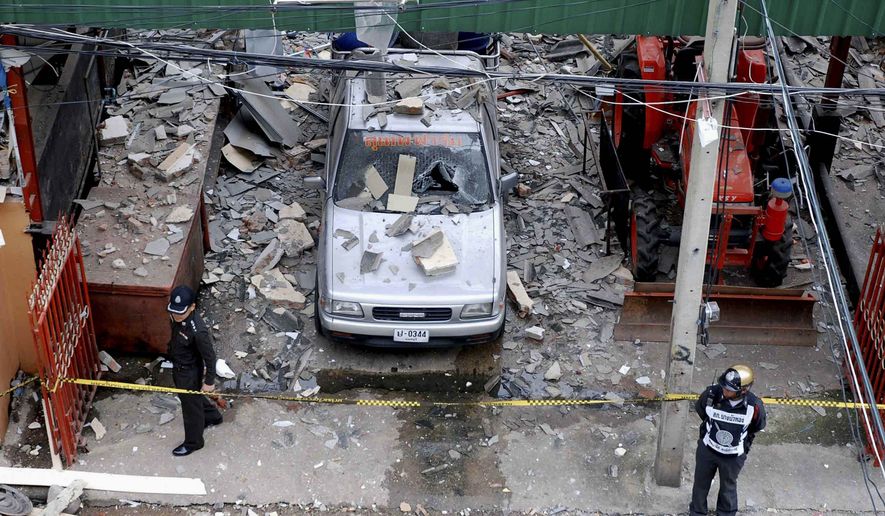BANGKOK | Deadly bombings across Bangkok have evoked fear and confusion as the country’s military and police have been unable to keep the capital safe despite their years of counterterrorism training by the U.S.
In what sounded like a macabre weather report, government officials recently warned that more bomb attacks likely would occur in October, but might taper off in November. Police have said the city has endured an average of almost two bombings a week this year.
Security officials suspect pro-democracy “Red Shirt” rebels may be unleashing revenge assaults for the military crushing their nine-week insurrection in May, which left 91 people dead and more than 1,500 injured.
“If the conflict is not resolved, it is likely that more bombs will be used in attacks, especially IEDs [improvised explosive devices] because they are easily assembled,” said explosive-ordnance disposal police Lt. Col. Khamthorn Auicharoen.
Bangkok’s bombers also might be acquiring explosives from southern Thailand, where the military has been unable to quash minority-Muslim Malay-Thai insurgents in a murky conflict that has killed more than 4,000 people on all sides since 2004.
However, some skeptics suspect rifts within the highly politicized military have enabled some of the attacks, noting that the army’s top officer recently implored his troops not to seek violent retribution.
“Do not seek to destroy the army, even if you have failed to secure a promotion,” the army’s chief officer, Gen. Prayuth Chan-ocha, told Thailand’s splintered, poorly disciplined soldiers in early October.
In addition, the theft of 32 rocket-propelled grenades, 8,000 rounds for U.S.-supplied M-16 assault rifles and other weaponry from an army arsenal in September remains unsolved, as does the theft of 69 hand grenades and 3,100 rounds for assault rifles that occurred at a different army depot in March.
Police have said a variety of military-type explosives, such as hand grenades and rocket-propelled grenades, have been used in some bombings.
The English-language Bangkok Post newspaper on Sunday published a “How to Identify a Bomb” advisory that described an array of grenades, Molotov cocktails and IEDs built with dynamite, empty fire extinguishers, cooking-gas cylinders, fertilizer, diesel fuel, nails, fireworks and detonators linked to cell phones that have been used in recent weeks to wreak havoc in the Thai capital.
The worst blast to hit the Bangkok area ripped apart two floors of an apartment building on Oct. 5 in Nonthaburi province, about 25 miles north of Bangkok, and killed four people, including the purported bomb maker.
Investigators said electrician Samai Wongsuwan — a known Red Shirt activist from Chiang Mai in northern Thailand — was killed when the bomb he was making with 22 pounds of TNT detonated accidentally.
Nine others were injured in the explosion, and city officials ordered the five-story building to be razed because it could collapse.
In September, bombings and attempted bombings in Bangkok targeted a school, a shopping mall’s parking garage, the Public Health Ministry’s parking lot, the Royal Turf Club, a ruling politician’s office and public sidewalks.
At least 71 bombs reportedly have exploded this year in Bangkok, causing damage, injuries and several deaths — averaging nearly two bombings a week. An additional 43 explosive devices have been defused this year, police said.
The scattered timing and locations of the blasts have people baffled and worried.
“It’s not right in my face, but I’m of course scared,” said one business executive. “I think if people see something funny, or weird, they should tell an officer.”
Unable to stop the assaults, officials have expressed strained hopes.
“I would like to thank the people for staying alert and cooperating with police following the recent bombings,” Prime Minister Abhisit Vejjajiva said in his weekly broadcast on Sunday. “If everyone works together, the situation will be restored soon.”
In September, the prime minister was similarly unable to protect the citizenry and said: “Many people, including myself, have assessed the situation and decided we will have to be more cautious over the next two weeks.”
Others are nervous about the possibility of yet another military coup in a country that has experienced more than 18 successful and attempted putsches since the 1930s.
“I will try to step back from politics, be clear of it, and leave it with the government so that soldiers can do their military work,” said Gen. Prayuth, who helped stage the 2006 coup.
“But if the nation has not returned to order, the military — as a mechanism of the government — must help build order first,” added the general, who was promoted to the military’s top slot on Oct. 1.
The United States has spent millions of dollars to train and arm Thailand’s military since the 1960s and currently trains its police through the State Department’s Anti-Terrorism Assistance Program in the U.S. and in Bangkok.
The Defense Department’s Force Protection Detachment at the U.S. Embassy in Bangkok also has trained and equipped police with hand-held metal detectors, lights, mirrors to check under cars for concealed bombs, and other items.
• DELETE Richard S. Ehrlich can be reached at rehrlich3@washingtontimes.com.




Please read our comment policy before commenting.